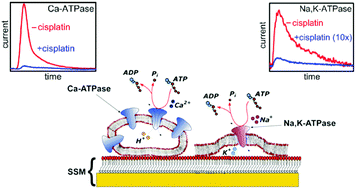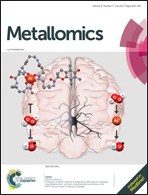Effect of cisplatin on the transport activity of PII-type ATPases
Abstract
Cisplatin (cis-diamminedichlorido-Pt(II)) is extensively used as a chemotherapeutic agent against various types of tumors. However, cisplatin administration causes serious side effects, including nephrotoxicity, ototoxicity and neurotoxicity. It has been shown that cisplatin can interact with P-type ATPases, e.g., Cu+-ATPases (ATP7A and ATP7B) and Na+,K+-ATPase. Cisplatin-induced inhibition of Na+,K+-ATPase has been related to the nephrotoxic effect of the drug. To investigate the inhibitory effects of cisplatin on the pumping activity of PII-type ATPases, electrical measurements were performed on sarcoplasmic reticulum Ca2+-ATPase (SERCA) and Na+,K+-ATPase embedded in vesicles/membrane fragments adsorbed on a solid-supported membrane. We found that cisplatin inhibits SERCA and Na+,K+-ATPase only when administered without a physiological reducing agent (GSH); in contrast, inhibition was also observed in the case of Cu+-ATPases in the presence of 1 mM GSH. Our results indicate that cisplatin is a much stronger inhibitor of SERCA (with an IC50 value of 1.3 μM) than of Na+,K+-ATPase (with an IC50 value of 11.1 μM); moreover, cisplatin inhibition of Na+,K+-ATPase is reversible, whereas it is irreversible in the case of SERCA. In the absence of a physiological substrate, while Cu+-ATPases are able to translocate cisplatin, SERCA and Na+,K+-ATPase do not perform ATP-dependent cisplatin displacement.



 Please wait while we load your content...
Please wait while we load your content...